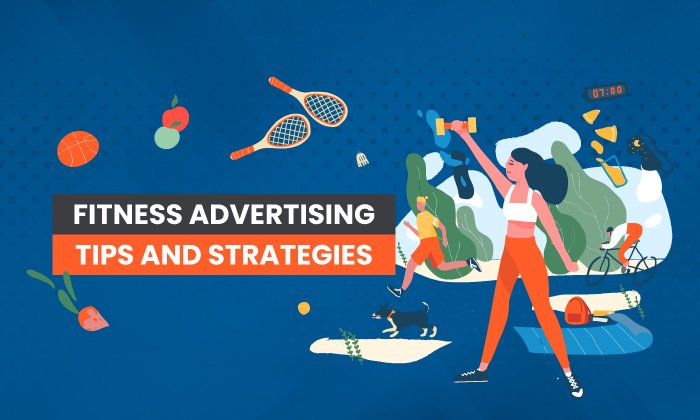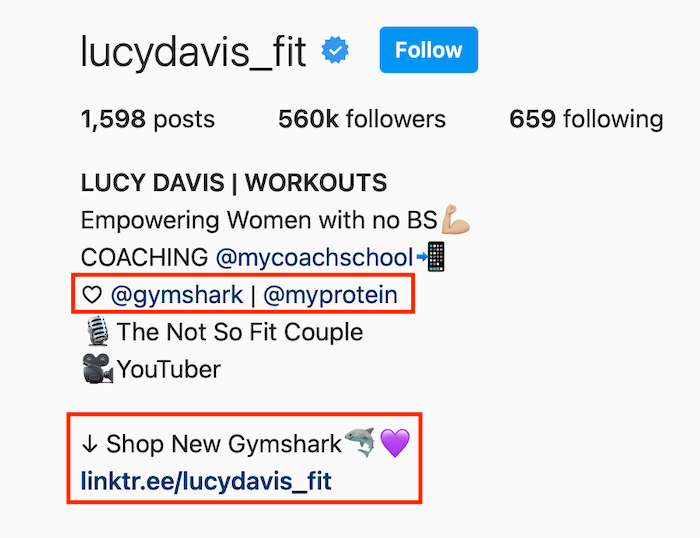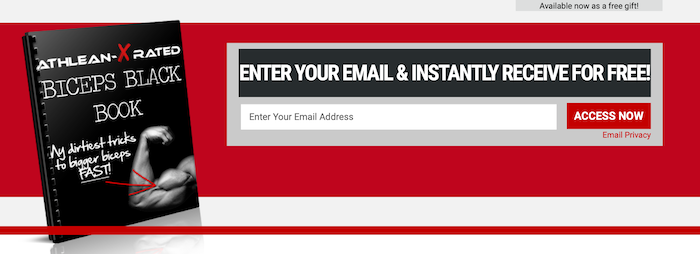
The health and fitness industry is worth over $96 billion dollars. For fitness service providers, this means one thing: you need an effective marketing strategy to stand out in this fast-growing, high-stakes marketplace.
Whether you’re a small gym owner, supplement company, or fitness app developer, the following fitness advertising strategies will help you generate maximum brand awareness and grow your business.
4 Unique Attributes of Fitness Advertising
Every industry has its own unique marketing challenges, and the fitness sector is no exception. Before we look at specific advertising strategies for the fitness industry, let’s break down the main challenges you’ll face in this niche.
1. There’s a Ton of Competition
The health and fitness industry is hugely saturated. In the USA alone, there are:
Standing out from the crowd in this industry isn’t easy, but don’t worry, it’s possible.
2. There Are Regulations You Have to Follow
The Federal Trade Commission (FTC) regulates the claims you can make when selling health and fitness products like supplements, weight loss tools, and health devices. In short, you can’t make any claim unless you can back it up with evidence.
What’s more, social media platforms may have other restrictions on what you can say in a fitness ad. For example, on Facebook, you can’t use before and after pictures, and you can’t use language or visuals likely to make people feel bad about their weight:
Fitness advertising regulations must be carefully considered before launching a campaign.
3. Fitness Advertising Relies Heavily on Visuals
Fitness advertising relies pretty heavily on visual content. People want to see how your products could benefit them, or how you can help them on their fitness and weight loss journey.
Social media posts and blog posts are great, but they’re not enough on their own in the fitness market. You’ll also need visual content such as user-generated content, instruction videos, nutritious recipe videos, and transformation pictures (on platforms where they’re permitted).
4. You Are (Usually) Selling Directly to Consumers
Typically, you’re marketing fitness goods and services directly to individuals, rather than businesses. For example, maybe you’re a personal trainer looking for new clients, or you’re a gym trying to build a member base.
Business-to-consumer (B2C) marketing, as it’s called, comes with its own challenges. In addition to growing brand awareness and generating leads, you also need to build effective customer relationships to stand out from your competitors. You must provide people with a memorable user experience and show them you value their business.
If you sell directly to businesses, such as gyms, you’ll focus on a business-to-business (B2B) marketing model. While some of the strategies below can help, you should also check out my guide to B2B marketing.
7 Fitness Advertising Strategies to Test
Are you ready to give fitness advertising a go? Great! Now all you need to do is figure out how to shape your campaign. Here are seven advertising strategies that will help you reach your goal.
1. Leverage Influencer Marketing to Reach a Wider Audience
Fitness influencers are influential people who can persuade their followers to try different clothing brands, supplements, workouts, and more. Unsurprisingly, they can also help a new fitness company expand its customer base.
Here’s an example of an Instagram bio for an influencer who represents two popular fitness brands, Gymshark and MyProtein:

How do you choose an influencer for your brand, though? Don’t fall into the trap of assuming that influencers with millions of followers are the only way to go. It’s all about picking an influencer who aligns with your brand and your target audience.
Where do you start?
First, consider reaching out to micro influencers. They have smaller subscriber numbers but can promote your brand very effectively in a niche market. Or, you can check out influencer marketplaces to find a public figure who may be suitable for a campaign.
Finally, don’t forget to do your research. Check out which influencers work for your competitors and try to find similar figures for your own campaign.
2. Use Social Media to Build Your Fitness Brand
Instagram boasts over 170 million U.S. users. TikTok? Just shy of 66 million. Facebook? Nearly 2.9 billion users worldwide.
For fitness advertising professionals, this means one thing: you social media.
Ensure you have an eye-catching logo, a clear name, and a strong brand message, and set up an account on two or three platforms. Use popular hashtags in your posts to get noticed, engage with followers, and post consistently to improve your chances of success.
If you need inspiration, check out popular fitness trainers on Instagram like Katie Crewe and Ben Bruno.
3. Run Paid Ads to Drive ROI
If you have a solid subscriber base on a platform like Facebook or Instagram, consider running a paid ad campaign. Paid ads not only help generate revenue, they also increase your reach, which is critical for standing out in a crowded market.
You can opt for a Google Ads campaign instead, but you may see a more impressive ROI if you run campaigns on platforms where you have an established audience.
Are you running paid ads? Track them closely using tools like Google Analytics to ensure they’re actually working for you effectively.
4. Use Lead Magnets to Build an Email List
If you want to build an email list, you need a lead magnet.
A “lead magnet” is something valuable you offer people in exchange for their email address. It can be anything from a free recipe guide to a discount voucher, depending on your budget and your marketing goals.
Here’s an example from ATHLEAN-X, a hugely popular fitness brand. In exchange for an email address, you can download his free bodybuilding guide:

Or, like Strong Strong Friends, you can offer a free training week, which may encourage people to sign up for a paid program:

To create an effective lead magnet, you need to know your audience and understand what they value. Research your options and consider running a few lead magnets concurrently to measure which one is most successful.
The work doesn’t stop once you have your leads, though. You must nurture them! Send them useful content to build engagement and trust in your brand.
5. Create a Membership Site
Membership sites are like clubs where people pay to access informative “members-only” content. For example, you might offer people the following exclusive perks:
- workouts
- exercise form tutorials
- meal plans
- supplement guides
Here’s an example from the Women’s Wellness Collective. Members can choose from a monthly or annual fee package, which gives more flexibility to accommodate different budgets.
Each package offers expert advice, holistic healing tips, and support from an exclusive community in exchange for their membership fee:

It’s really simple for users to take the next step: all they need to do is click the sign-up button to get started.
This business owner gets three key things right: they set themselves apart as a niche expert, they make it simple to sign up with a clear CTA, and they offer people the chance to join a thriving community.
A community can help people feel more inspired and supported to reach their goals, so consider making a members-only forum, support group, or social media page part of your membership offering.
6. Try Video Marketing
YouTube, one of the world’s most popular video-sharing websites, is ideal for fitness professionals trying to grow their business through online exposure. You don’t need professional recording equipment to start filming, and if you put out regular video content, you could build a solid subscriber base.
From a fitness advertising perspective, here are four different types of videos to consider creating:
- If you’re a gym owner, create a promo video showcasing your facilities. Include clips of members using your equipment.
- Create a list of quick fitness tips in video format, such as how to work out from home, how to start strength training, or how to choose a supplement.
- If you have qualifications and experience in injury rehab or physiotherapy, create videos talking people through common injuries and how to manage them effectively.
- Interview other fitness professionals and post the video on your channel to demonstrate your expertise.
Keep your videos short and engaging, and always end with a clear CTA such as subscribing to your channel or reaching out for a personal training session.
7. Share Customer and Client Testimonials
Encourage happy customers to leave reviews about your goods and services online. When prospective customers see happy reviews, they’re more likely to convert.
In fact, 87 percent of customers read reviews for local businesses, and 94 percent of people are more likely to use a business with positive online reviews. This makes sense, especially in the fitness industry: people want to know they can trust you to deliver results.
How do you get reviews, though? Start by asking customers directly, whether it’s by email or in person, and maybe offer an incentive like a discount voucher. (Make sure this is permitted by the review platform; some prohibit offering an incentive.) You could also run surveys to get feedback.
Once you have your reviews, you can turn them into client testimonials and add images or videos. Remember, visuals are key to crafting a successful fitness advertising campaign, so bring your reviews to life by turning them into engaging graphics.
A word of caution, though: just make sure you have permission to use their review in this way!
If you need a little more guidance on launching a fitness advertising campaign, don’t forget to check out my consulting services.
Frequently Asked Questions About Fitness Advertising
What is fitness advertising?
Fitness advertising is a catch-all term for marketing in the fitness industry. It covers everything from gym memberships to supplements. The goal is to show potential clients and customers why they should choose your goods and services in a highly competitive and saturated marketplace.
How can I advertise my fitness brand?
Start by building brand awareness on social media and popular online platforms, and consider partnering with influencers in the fitness space. Try a blend of different fitness advertising techniques and compare the results of each campaign.
Is there anything I can’t say in my fitness adverts?
You can’t make medical or health claims without accurate, truthful, and reliable evidence to back them up. You can’t make misleading claims, either, and most importantly, you can’t sell anything with illegal or banned ingredients.
How do I track the success of my fitness advertising strategies?
To track your fitness ad campaigns, turn to measuring tools like Google Analytics. Focus on metrics like impressions, reach, CTR, and engagement levels. The exact metrics you should track will depend on the type of ads you run and your marketing goals.
Fitness Advertising Conclusion
The health and fitness industry is hugely competitive, which is why you need a carefully crafted marketing plan to succeed. Clarify your fitness advertising goals, identify your target audience, then pick a few ad strategies most likely to appeal to your chosen demographic. Track your metrics carefully, and be prepared to shift strategies once you find what works.
Above all, in this consumer-focused industry, remember to prioritize the user experience. This alone can help you stand out from the crowd!
Have you tried out any of these fitness advertising strategies yet?

See How My Agency Can Drive Massive Amounts of Traffic to Your Website
- SEO – unlock massive amounts of SEO traffic. See real results.
- Content Marketing – our team creates epic content that will get shared, get links, and attract traffic.
- Paid Media – effective paid strategies with clear ROI.



